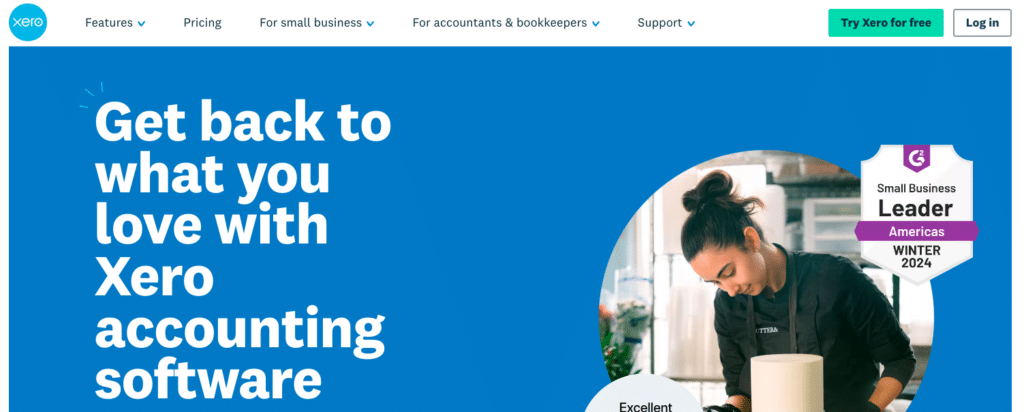Are you torn between QuickBooks and Xero for your business accounting needs? You’re not alone. These two powerhouses dominate the accounting software market, each with its own strengths.
Let’s dive into a detailed comparison to help you make the right choice for your company.
QuickBooks and Xero at a Glance
Before we pit these two against each other, let’s get to know our contenders.
What is QuickBooks?

QuickBooks is known for its user-friendly interface and wide range of features, making it a good fit for small businesses and those new to accounting. It boasts robust reporting capabilities and strong integrations with other business tools.
What is Xero?

Xero is a cloud-based accounting platform designed with accountants and bookkeepers in mind. Xero is recognized for its intuitive dashboard, focus on collaboration and powerful features like project tracking and multi-currency support, and more!
| Category | QuickBooks | Xero |
| Pricing | • Simple Start: $30/month • Essentials: $55/month • Plus: $85/month • Advanced: $200/month | • Early: $12/month • Growing: $34/month • Established: $65/month |
| User Interface | • Feature-rich but can be complex • Steeper learning curv e• Customizable dashboard | • Clean and intuitive • User-friendly for beginners • Modern, streamlined design |
| Core Accounting Features | • 40 active tracking categories • Advanced inventory management • Detailed financial reporting • Strong project profitability tracking | • 2 active tracking categories • Excellent bank reconciliation • Built-in fixed asset management • Strong multi-currency support |
| Integrations | • Extensive ecosystem of integrations • Wide range of industry-specific add-ons • Strong e-commerce integrations | • Growing list of integrations • Focus on modern, cloud-based solutions • Strong API for custom integrations |
| User Limits | • 1-25+ users depending on plan • Additional fees for extra users | • Unlimited users on all plans |
Feature Face-Off: QuickBooks vs Xero
Now, let’s see how these two stack up in key areas that matter most to small businesses.
User Experience: Simplicity vs Depth
Xero takes the lead with its intuitive interface. New users often find it easier to navigate and start using effectively. The clean design and logical layout make daily tasks a breeze.
QuickBooks, while powerful, comes with a steeper learning curve. Its interface is more complex, reflecting its broader range of features. However, once mastered, it offers deeper functionality.
Crunching Numbers: Core Accounting Capabilities
Both platforms excel in essential accounting features:
- Invoicing: Create and send professional invoices
- Expense Tracking: Monitor and categorize business expenses
- Financial Reporting: Generate detailed reports for business insights
QuickBooks edges out Xero in the depth of its reporting capabilities. It offers more customization options and a wider variety of reports. However, Xero’s reports are often praised for their clarity and visual appeal.
A notable difference lies in tracking categories. QuickBooks Online allows for 40 active tracking categories, while Xero limits users to just 2. This can be a significant factor for businesses needing detailed cost center analysis.
Playing Well with Others: Integrations and Add-ons
In today’s interconnected business world, the ability to integrate with other software is crucial.
QuickBooks boasts a vast ecosystem of integrations, covering everything from payroll to inventory management. Its long-standing market presence has allowed it to build partnerships with a wide range of software providers.
Xero, while having fewer integrations overall, focuses on quality over quantity. Its add-ons are often praised for their seamless integration and user-friendly nature.
[Insert visual: Infographic illustrating the pros and cons of each platform]
Dollars and Sense: Pricing and Value
When it comes to choosing accounting software, cost is often a deciding factor. Let’s break down the pricing structures and value propositions of both platforms.
Show Me the Money: Cost Comparison
[Insert visual: Pricing chart showing different plans for both software]
QuickBooks Online offers several tiers:
- Simple Start: $30/month
- Essentials: $55/month
- Plus: $85/month
- Advanced: $200/month
Xero provides three main plans:
- Early: $13/month
- Growing: $37/month
- Established: $70/month
At first glance, Xero appears more budget-friendly. However, it’s essential to consider what features are included at each price point and any potential hidden costs.
Bang for Your Buck: Value Analysis
When assessing value, consider:
- Feature set at each price tier
- User limits (QuickBooks restricts the number of users for lower-tier plans)
- Scalability as your business grows
Xero often comes out ahead in terms of value, especially for small to medium-sized businesses. Its unlimited user policy at all levels is a significant advantage. However, QuickBooks’ advanced features may justify the higher cost for larger or more complex businesses.
The Good, the Bad, and the Bookkeeping: Pros and Cons
Every software has its strengths and weaknesses. Let’s sum up the main advantages and disadvantages of each platform.
QuickBooks: Powerhouse with a Learning Curve
Pros:
- Comprehensive feature set
- Excellent reporting capabilities
- Wide range of integrations
- Strong presence in the US market
Cons:
- Steeper learning curve
- Higher pricing, especially for advanced features
- User limits on lower-tier plans
Xero: User-Friendly with Room to Grow
Pros:
- Intuitive, user-friendly interface
- Unlimited users on all plans
- Competitive pricing
- Popular among accountants and bookkeepers
Cons:
- Fewer advanced features compared to QuickBooks
- Limited tracking categories
- Smaller ecosystem of integrations
The Verdict: Industry Preferences and User Opinions
Understanding how these platforms are perceived by professionals and users can provide valuable insights.
What the Pros Say: Accountant and Bookkeeper Preferences
Interestingly, many accountants and bookkeepers lean towards Xero. This preference stems from:
- Xero’s clean, easy-to-navigate interface
- The ability to collaborate with clients more easily
- Robust bank reconciliation features
The implication for businesses? If you work closely with an accountant, they might prefer you use Xero, potentially streamlining your collaboration.
Making the Call: Choosing the Right Software for Your Business
With all this information, how do you decide which platform is right for you? Consider these key factors:
- Business Size and Complexity: Larger businesses with complex needs might benefit more from QuickBooks’ advanced features.
- Budget: If cost is a primary concern, Xero’s competitive pricing might be more attractive.
- User-Friendliness: For those new to accounting software, Xero’s intuitive interface could be a deciding factor.
- Scalability: Consider which platform will grow best with your business over time.
- Integrations: Evaluate which software integrates better with your existing business tools.
Best Fits: Matching Software to Business Types
While every business is unique, here are some general guidelines:
- Solopreneurs and Micro-businesses: Xero’s Early plan or QuickBooks Simple Start
- Small to Medium Businesses: Xero Growing or QuickBooks Essentials/Plus
- Larger Small Businesses or Those with Complex Needs: QuickBooks Advanced or Xero Established
The Bottom Line: Your Business, Your Choice
Both QuickBooks and Xero are solid choices for small business accounting. QuickBooks offers depth and customization, while Xero brings user-friendliness and collaboration to the table.
Your choice depends on your specific needs, budget, and how you like to work. Remember, the best accounting software is the one you’ll actually use consistently.
Whichever platform you choose, remember that the true power of your accounting software can be amplified by integrating with tools like Coefficient. By syncing your financial data directly into spreadsheets, you can unlock even more powerful reporting and analysis capabilities.
Ready to take your financial reporting to the next level? Get started with Coefficient today and see how real-time data integration can transform your financial processes.





